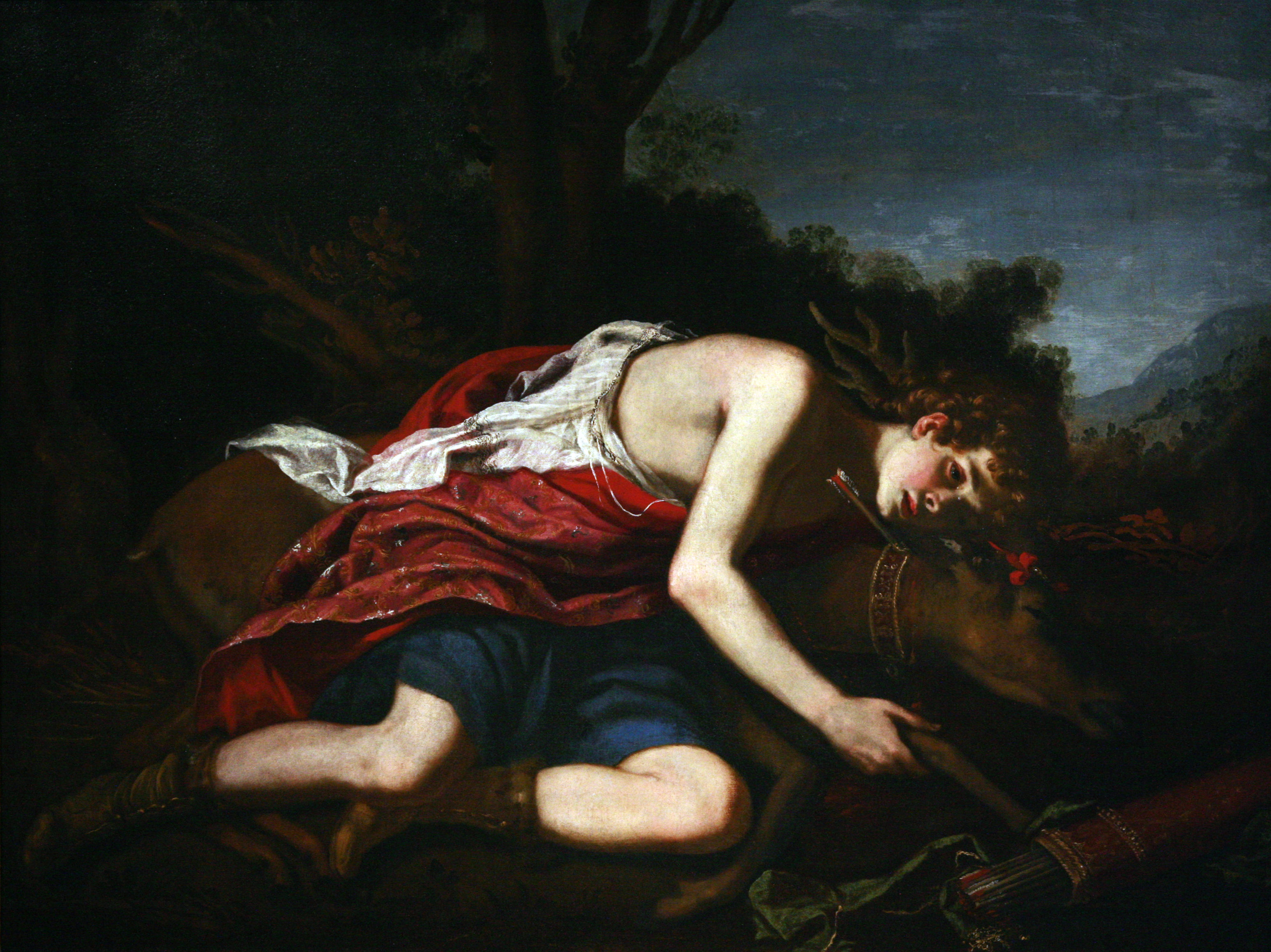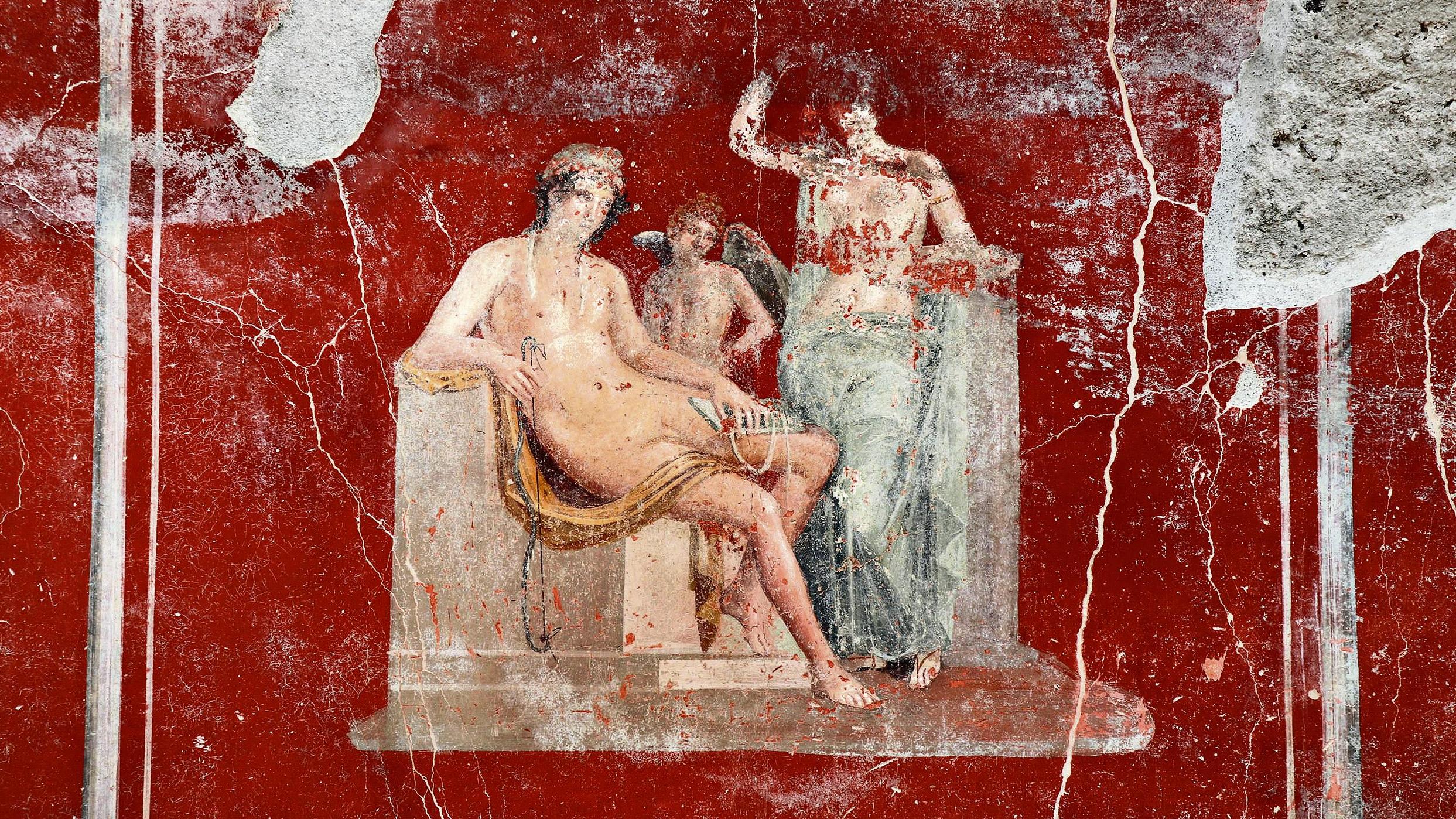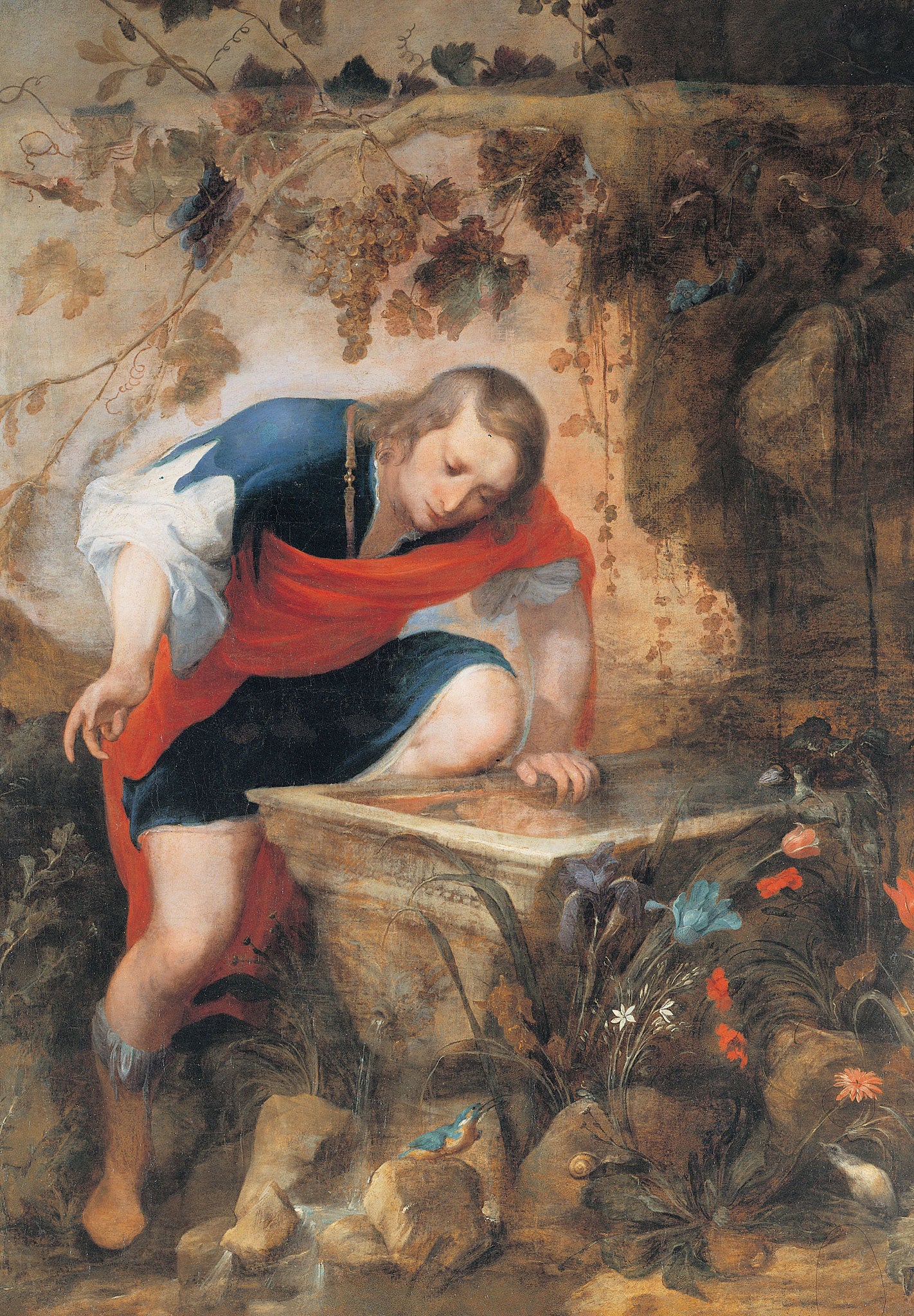|
LGBT Themes In Classical Mythology
Greco-Roman mythology features male homosexuality in many of the constituent myths. In addition, there are instances of cross-dressing, and of androgyny which has been grouped under the acronym LGBTQ+. Overall These myths have been described as being crucially influential on Western LGBT literature, with the original myths being constantly re-published and re-written, and the relationships and characters serving as icons. In comparison, lesbianism is rarely found in classical myths. Sexuality Homosexuality and bisexuality Apollo, the god of sun and music, is considered the patron of same sex love, as he had many male lovers and was often invoked to bless homosexual unions. He is also called "the champion of male love" by Andrew Callimach. Other gods are sometimes considered patrons of homosexual love between males, such as the love goddess Aphrodite and gods in her retinue, such as the Erotes: Eros, Himeros and Pothos. Eros is also part of a trinity of gods that played roles in ... [...More Info...] [...Related Items...] OR: [Wikipedia] [Google] [Baidu] |
Greco-Roman Mythology
Classical mythology, Greco-Roman mythology, or Greek and Roman mythology is both the body of and the study of myths from the ancient Greeks and ancient Romans as they are used or transformed by cultural reception. Along with philosophy and political thought, mythology represents one of the major survivals of classical antiquity throughout later Western culture. The Greek word ''mythos'' refers to the spoken word or speech, but it also denotes a tale, story or narrative. As late as the Roman conquest of Greece during the last two centuries Before the Common Era and for centuries afterwards, the Romans, who already had gods of their own, adopted much mythology directly from the Greeks while preserving their own Roman (Latin) names for the gods. In storytelling and literature, this thereby caused an equivalence between many Roman and Greek deities; some examples include between the Roman sky god Jupiter or Jove and the Greek counterpart Zeus; between the Roman fertility goddess Venu ... [...More Info...] [...Related Items...] OR: [Wikipedia] [Google] [Baidu] |
Agamemnon
In Greek mythology, Agamemnon (; grc-gre, Ἀγαμέμνων ''Agamémnōn'') was a king of Mycenae who commanded the Greeks during the Trojan War. He was the son, or grandson, of King Atreus and Queen Aerope, the brother of Menelaus, the husband of Clytemnestra and the father of Iphigenia, Electra, Laodice (Greek myth), Laodike (Λαοδίκη), Orestes and Chrysothemis. Legends make him the king of Mycenae or Argos, Peloponnese, Argos, thought to be different names for the same area. Agamemnon was killed upon his Returns from Troy, return from Troy, either by his wife's lover Aegisthus or by his wife herself. Etymology His name in Greek, Ἀγαμέμνων, means "very steadfast", "unbowed" or "resolute". The word comes from Linguistic reconstruction, *Ἀγαμέδμων (''*Agamédmōn'') from ἄγαν, "very much" and wikt:μέδομαι, μέδομαι, "think on". Description In the account of Dares Phrygius, Dares the Phrygian, Agamemnon was described as ". . .bl ... [...More Info...] [...Related Items...] OR: [Wikipedia] [Google] [Baidu] |
Cyparissus
In Greek mythology, Cyparissus or Kyparissos (Ancient Greek: Κυπάρισσος, "cypress") was a boy beloved by Apollo or in some versions by other deities. In the best-known version of the story, the favorite companion of Cyparissus was a tamed stag, which he accidentally killed with his hunting javelin as it lay sleeping in the woods. The boy's grief was such that it transformed him into a cypress tree, a classical symbol of mourning. The myth is thus aetiological in explaining the relation of the tree to its cultural significance. The subject is mainly known from Hellenized Latin literature and frescoes from Pompeii. No Greek hero cult devoted to Cyparissus has been identified. Family Cyparissus was the son of Telephus and thus the grandson of Heracles, and his story is set in Chios. Mythology As initiation myth The myth of Cyparissus, like that of Hyacinthus, has often been interpreted as reflecting the social custom of pederasty in ancient Greece, with the boy ... [...More Info...] [...Related Items...] OR: [Wikipedia] [Google] [Baidu] |
Pausanias (geographer)
Pausanias ( /pɔːˈseɪniəs/; grc-gre, Παυσανίας; c. 110 – c. 180) was a Greek traveler and geographer of the second century AD. He is famous for his ''Description of Greece'' (, ), a lengthy work that describes ancient Greece from his firsthand observations. ''Description of Greece'' provides crucial information for making links between classical literature and modern archaeology. Biography Not much is known about Pausanias apart from what historians can piece together from his own writing. However, it is mostly certain that he was born c. 110 AD into a Greek family and was probably a native of Lydia in Asia Minor. From c. 150 until his death in 180, Pausanias travelled through the mainland of Greece, writing about various monuments, sacred spaces, and significant geographical sites along the way. In writing ''Description of Greece'', Pausanias sought to put together a lasting written account of "all things Greek", or ''panta ta hellenika''. Living in th ... [...More Info...] [...Related Items...] OR: [Wikipedia] [Google] [Baidu] |
Carnus
In Greek mythology, Carnus (also spelled Carneus and Carneius) ( Ancient Greek: Κάρνος) was a seer from Acarnania, who was instructed in the art of divination by Apollo. According to the poet Praxilla, he was a son of Europa, who was brought up by Apollo and Leto. Alternatively, he was Apollo's lover and friend in some accounts. Carnus accompanied the Heracleidae, and was killed by Hippotes with a spear for giving obscure prophecies. Apollo then struck the Dorians with plague; having consulted an oracle, they banished Hippotes from their camp and established a cult of Apollo Carneius to propitiate the god.Pausanias3.13.4/ref> Notes References * Conon'', Fifty Narrations, surviving as one-paragraph summaries in the Bibliotheca (Library) of Photius, Patriarch of Constantinople'' translated from the Greek by Brady KieslingOnline version at the Topos Text Project. * Pausanias, ''Description of Greece'' with an English Translation by W.H.S. Jones, Litt.D., and H.A. Ormerod ... [...More Info...] [...Related Items...] OR: [Wikipedia] [Google] [Baidu] |
Conon (mythographer)
Conon ( grc-gre, Κόνων, ''gen''.: Κόνωνος) was a Greek grammarian and mythographer of the age of Augustus (who lived 63 BC – 14 AD), the author of a work titled (Narrations), addressed to Archelaus Philopator, king of Cappadocia. It was a collection of fifty narratives relating to the mythical and heroic period, and especially the foundation of colonies. An epitome of the work was preserved in the '' Bibliotheca'' of Photius Photios I ( el, Φώτιος, ''Phōtios''; c. 810/820 – 6 February 893), also spelled PhotiusFr. Justin Taylor, essay "Canon Law in the Age of the Fathers" (published in Jordan Hite, T.O.R., & Daniel J. Ward, O.S.B., "Readings, Cases, Materia ..., the 9th-century patriarch of Constantinople. Photius commends Conon's Attic style, and remarks that Nicolaus Damascenus borrowed much from him. There are separate editions of this abstract by Gale, by Teucher, and Kanne. Dion ChrysostomOr. xviii. torn. i. p. 480. mentions a rhetorician of ... [...More Info...] [...Related Items...] OR: [Wikipedia] [Google] [Baidu] |
Branchus (lover Of Apollo)
Branchus (; grc, Βράγχος, Brankhos) was the son of Smyrcus and a lover of the god Apollo in Greek mythology. Initially a shepherd in Miletus, Branchus became a prophet after receiving prophetic abilities from Apollo. He introduced the worship of the god at Didyma and founded a shrine for him at Miletus. His descendants, the Branchides, were an influential clan of prophets. Mythology Birth Branchus was the son of Smyrcus and a distinguished Milesian woman. When giving birth, his mother had a vision of the sun entering her mouth, passing through her stomach and emerging from her genitals. The seers took this to be an excellent omen, and so her son was named Branchus, since the sun had passed through her ''bronchia'' (throat).Conon, ''Narrations'33/ref> Encounter with Apollo Branchus grew up to be the most handsome of men. One day, he came across Apollo in the woods and, being enchanted with the beauty of the god, kissed him. Apollo embraced him and returned his affe ... [...More Info...] [...Related Items...] OR: [Wikipedia] [Google] [Baidu] |
Ptolemy Hephaestion
Ptolemy Chennus or Chennos ("quail") ( grc-koi, Πτολεμαῖος Χέννος ''Ptolemaios Chennos''), was an Alexandrine grammarian during the reigns of Trajan and Hadrian. According to the ''Suda'', he was the author of an historical drama named ''Sphinx'', of an epic, ''Anthomeros'', in 24 books (both lost) and a ''Strange History''. The last is probably identical with the ''New History'' in six books ascribed by Photius to Ptolemy Hephaestion, of which a summary outline has been preserved in Photius' ''Biblioteca'' (cod. 190), who observed sarcastically of its credulous author that he found it "a work really useful for those who undertake to attempt erudition in history," for "it abounds in extraordinary and badly imagined information." It was dedicated to the author's lady, Tertulla, and contained a medley of all sorts of legends and fables belonging to both the mythological and historical periods. An identification with Ptolemy-el-Garib has been suggested, but this i ... [...More Info...] [...Related Items...] OR: [Wikipedia] [Google] [Baidu] |
Adonis
In Greek mythology, Adonis, ; derived from the Canaanite word ''ʼadōn'', meaning "lord".R. S. P. Beekes, ''Etymological Dictionary of Greek'', Brill, 2009, p. 23. was the mortal lover of the goddess Aphrodite. One day, Adonis was gored by a wild boar during a hunting trip and died in Aphrodite's arms as she wept. His blood mingled with her tears and became the anemone flower. Aphrodite declared the Adonia festival commemorating his tragic death, which was celebrated by women every year in midsummer. During this festival, Greek women would plant "gardens of Adonis", small pots containing fast-growing plants, which they would set on top of their houses in the hot sun. The plants would sprout, but soon wither and die. Then the women would mourn the death of Adonis, tearing their clothes and beating their breasts in a public display of grief. The Greeks considered Adonis's cult to be of Near Eastern origin. Adonis's name comes from a Canaanite word meaning "lord" and most ... [...More Info...] [...Related Items...] OR: [Wikipedia] [Google] [Baidu] |
Callimachus
Callimachus (; ) was an ancient Greek poet, scholar and librarian who was active in Alexandria during the 3rd century BC. A representative of Ancient Greek literature of the Hellenistic period, he wrote over 800 literary works in a wide variety of genres, most of which did not survive. He espoused an aesthetic philosophy, known as Callimacheanism, which exerted a strong influence on the poets of the Roman Empire and, through them, on all subsequent Western literature. Born into a prominent family in the Greek city of Cyrene in modern-day Libya, he was educated in Alexandria, the capital of the Ptolemaic kings of Egypt. After working as a schoolteacher in the city, he came under the patronage of King Ptolemy II Philadelphus and was employed at the Library of Alexandria where he compiled the '' Pinakes'', a comprehensive catalogue of all Greek literature. He is believed to have lived into the reign of Ptolemy III Euergetes. Although Callimachus wrote prolifically in prose ... [...More Info...] [...Related Items...] OR: [Wikipedia] [Google] [Baidu] |
Admetus
In Greek mythology, Admetus (; Ancient Greek: ''Admetos'' means 'untamed, untameable') was a king of Pherae in Thessaly. Biography Admetus succeeded his father Pheres after whom the city was named. His mother was identified as Periclymene or Clymene. He was one of the Argonauts and took part in the Calydonian Boar hunt. Admetus' wife Alcestis offered to substitute her own death for his. The most famous of Admetus's children was Eumelus, who led a contingent from Pherae to fight in the Trojan War. He also had a daughter Perimele. Mythology Divine herdsman Admetus was famed for his hospitality and justice. When Apollo was sentenced to a year of servitude to a mortal as punishment for killing Delphyne, or as later tradition has it, the Cyclopes, the god was sent to Admetus' home to serve as his herdsman. Apollo in recompense for Admetus' treatment made all the cows bear twins while he served as his cowherd. The romantic nature of their relationship was first d ... [...More Info...] [...Related Items...] OR: [Wikipedia] [Google] [Baidu] |
Narcissus (mythology)
In Greek mythology, Narcissus (; Ancient Greek: Νάρκισσος ''Nárkissos'') was a hunter from Thespiae in Boeotia (alternatively Mimas or modern day Karaburun, Izmir) who was known for his beauty. According to Tzetzes, he rejected all romantic advances, eventually falling in love with his own reflection in a pool of water, staring at it for the remainder of his life. After he died, in his place sprouted a flower bearing his name. The character of Narcissus is the origin of the term narcissism, a fixation with oneself. This quality, in turn, contributes to the definition of narcissistic personality disorder, a psychiatric condition marked by grandiosity, excessive need for attention and admiration, and an inability to empathize. Like the myth of Laius and Chrysippus, the myth of Narcissus is a Boeotian pederastic cautionary tale, a story meant to teach by counter-example. Etymology The name is of Greek etymology. According to R. S. P. Beekes, " e suffixes ισ� ... [...More Info...] [...Related Items...] OR: [Wikipedia] [Google] [Baidu] |





